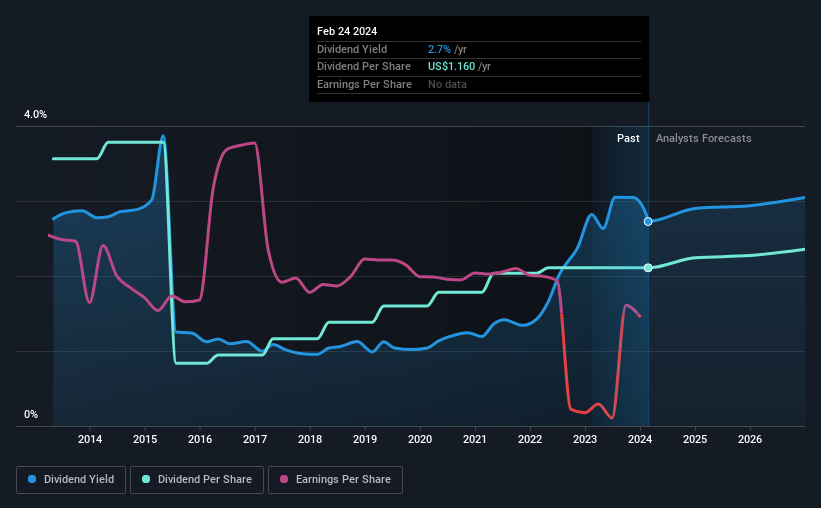It Might Not Be A Great Idea To Buy Baxter International Inc. (NYSE:BAX) For Its Next Dividend
Baxter International Inc. (NYSE:BAX) is about to trade ex-dividend in the next four days. The ex-dividend date is one business day before a company's record date, which is the date on which the company determines which shareholders are entitled to receive a dividend. It is important to be aware of the ex-dividend date because any trade on the stock needs to have been settled on or before the record date. Thus, you can purchase Baxter International's shares before the 29th of February in order to receive the dividend, which the company will pay on the 1st of April.
The company's next dividend payment will be US$0.29 per share, and in the last 12 months, the company paid a total of US$1.16 per share. Based on the last year's worth of payments, Baxter International has a trailing yield of 2.7% on the current stock price of US$42.55. We love seeing companies pay a dividend, but it's also important to be sure that laying the golden eggs isn't going to kill our golden goose! So we need to investigate whether Baxter International can afford its dividend, and if the dividend could grow.
Check out our latest analysis for Baxter International
Dividends are typically paid out of company income, so if a company pays out more than it earned, its dividend is usually at a higher risk of being cut. Baxter International lost money last year, so the fact that it's paying a dividend is certainly disconcerting. There might be a good reason for this, but we'd want to look into it further before getting comfortable. With the recent loss, it's important to check if the business generated enough cash to pay its dividend. If cash earnings don't cover the dividend, the company would have to pay dividends out of cash in the bank, or by borrowing money, neither of which is long-term sustainable. It paid out more than half (57%) of its free cash flow in the past year, which is within an average range for most companies.
Click here to see the company's payout ratio, plus analyst estimates of its future dividends.
Have Earnings And Dividends Been Growing?
Companies with falling earnings are riskier for dividend shareholders. If business enters a downturn and the dividend is cut, the company could see its value fall precipitously. Baxter International was unprofitable last year and, unfortunately, the general trend suggests its earnings have been in decline over the last five years, making us wonder if the dividend is sustainable at all.
Many investors will assess a company's dividend performance by evaluating how much the dividend payments have changed over time. Baxter International's dividend payments per share have declined at 5.1% per year on average over the past 10 years, which is uninspiring. While it's not great that earnings and dividends per share have fallen in recent years, we're encouraged by the fact that management has trimmed the dividend rather than risk over-committing the company in a risky attempt to maintain yields to shareholders.
Get our latest analysis on Baxter International's balance sheet health here.
The Bottom Line
From a dividend perspective, should investors buy or avoid Baxter International? We're a bit uncomfortable with it paying a dividend while being loss-making. However, we note that the dividend was covered by cash flow. It's not that we think Baxter International is a bad company, but these characteristics don't generally lead to outstanding dividend performance.
So if you're still interested in Baxter International despite it's poor dividend qualities, you should be well informed on some of the risks facing this stock. For example, Baxter International has 2 warning signs (and 1 which is concerning) we think you should know about.
Generally, we wouldn't recommend just buying the first dividend stock you see. Here's a curated list of interesting stocks that are strong dividend payers.
Have feedback on this article? Concerned about the content? Get in touch with us directly. Alternatively, email editorial-team (at) simplywallst.com.
This article by Simply Wall St is general in nature. We provide commentary based on historical data and analyst forecasts only using an unbiased methodology and our articles are not intended to be financial advice. It does not constitute a recommendation to buy or sell any stock, and does not take account of your objectives, or your financial situation. We aim to bring you long-term focused analysis driven by fundamental data. Note that our analysis may not factor in the latest price-sensitive company announcements or qualitative material. Simply Wall St has no position in any stocks mentioned.

